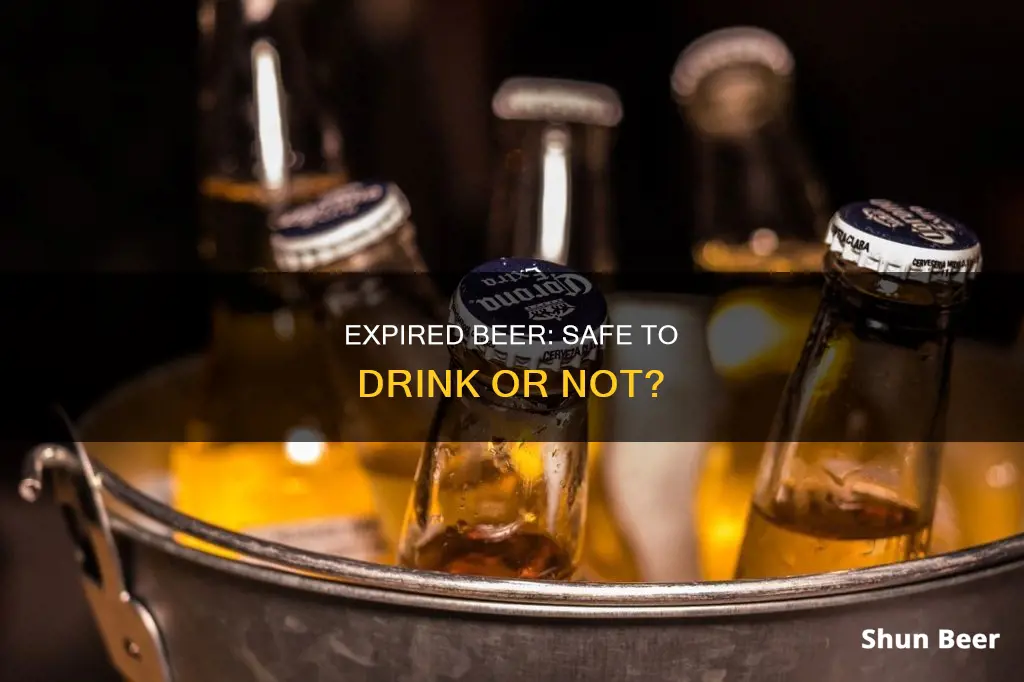
Drinking out-of-date beer is generally safe, but it might not taste very nice. Beer has a best before date, rather than a use by date, which is more of a guideline on quality than safety. While the alcohol content in beer means that pathogenic bacterial growth is unlikely, over time the taste will change, and the beer may become skunky or vinegary. The flavour of hoppy beers like IPAs will deteriorate faster than maltier beers, which can improve with age.
| Characteristics | Values |
|---|---|
| Is it safe to drink out-of-date beer? | In almost all cases, yes. The fermentation process, low pH level, and alcohol content make beer an unfriendly environment for microorganisms. |
| Will out-of-date beer make you sick? | No, but the taste will be unpleasant. |
| How long does beer last beyond its expiration date? | At room temperature, beer lasts about 5 to 9 months beyond the expiration date. In a refrigerator, beer can last up to 2-3 years beyond the expiration date. |
| How long does an opened beer last? | An opened beer has a shelf life of about a day, regardless of the expiration date. |
| How to tell if beer has gone bad? | Bad aroma, missing fizz, vinegary taste, excessive sediment. |
| How to store beer to maximise shelf life? | Store beer in a cool, dark place, away from temperature fluctuations. Keep it upright to minimise oxidation and avoid exposing it to direct sunlight. |
What You'll Learn

Is it safe to drink out-of-date beer?
Beer typically has a ''best before'' date, which is different from a "use by" date. "Use by" dates are more of a rule, and the food or drink in question will quickly degrade after this date. "Best before" is more of a guideline on quality, rather than safety. This means that the beer will start to lose its quality after the stated date, but it is still safe to consume.
Beer is unlikely to make you sick, even if it is consumed years after its "best before" date, as long as it is sealed. The fermentation process used in brewing, as well as its low pH level and alcohol content, make beer an unfriendly environment for microorganisms.
However, the taste of beer changes over time, and it may develop an unpleasant taste or aroma. Beer is also susceptible to oxidation, which can cause it to lose its flavour. Heat and light can also cause beer to spoil more quickly.
Therefore, it is generally recommended to drink beer as fresh as possible, and to store it in a cool, dark place, such as a refrigerator.
Enjoying Beer and Zoo Lights: What You Need to Know
You may want to see also

How long does beer last past its expiration date?
Beer typically lasts 5 to 9 months beyond the expiration date listed on the label if kept at room temperature. However, if refrigerated, beer can last up to an additional 2 to 3 years. This extended timeframe applies to bottled beer, cans, growlers, and other containers, as long as they remain unopened. Once opened, beer has a shelf life of about a day, regardless of the expiration date.
The shelf life of beer varies depending on the type of beer and storage conditions. Stronger beers, such as stouts, porters, and high-alcohol content beers, tend to have a longer shelf life than lighter beers like lagers and pilsners. Beers with higher alcohol content are sometimes brewed with aging in mind. For example, barley wines and imperial stouts are meant to be aged for a couple of years. On the other hand, hoppy beers like IPAs are best consumed fresh, as they gradually lose their flavour and aroma over time.
The packaging of the beer also affects its shelf life. Beer stored in transparent bottles, such as green or clear bottles, will have a shorter expiration date. This is because light exposure, especially UV rays, accelerates the oxidation process, causing the beer to develop a skunky odour and taste. Brown bottles offer better protection against UV light, while cans completely shield the beer from light exposure, helping to preserve its quality for longer.
Additionally, heat causes beer to spoil more quickly. According to the 3-30-300 rule, beer can be kept at 90°F for only 3 days, 30 days at 72°F, and up to 300 days at 38°F. Therefore, it is essential to store beer in a cool, dark place, away from temperature fluctuations, to maximise its shelf life.
Beer and Penicillin: A Risky Mix?
You may want to see also

How can you tell if beer has gone bad?
Beer can go bad, but it is unlikely to become unsafe to drink. If you sip a beer that has gone bad, you will likely experience unpleasant tastes and aromas.
- Smell — If the beer smells sour, funky, or like a skunk, urine, cardboard, buttered popcorn, butterscotch, or creamed corn, it has likely gone bad.
- Taste — If the beer tastes sour, or like apples, mowed grass, buttered popcorn, butterscotch, or creamed corn, it has probably gone bad.
- Appearance — If there is excessive sediment at the bottom of the bottle, or the beer has changed colour (e.g. from golden to brown), it may have gone bad.
- Carbonation — If there is a lack of foam rising after opening a bottle, or the beer is not as bubbly as it used to be, it may be past its prime.
- Sound — If the beer is missing the usual 'pssst' sound when you open it, it may have gone bad.
- Expiration date — Checking the expiration date on the bottle is the easiest way to tell if a beer has gone bad.
Beer and Drug Tests: What You Need to Know
You may want to see also

How to store beer to prevent it from going bad
Beer can be stored in a few different ways to prevent it from going bad. Here are some tips to ensure your beer stays fresh:
Store Beer in a Cool, Dark Place
Keep your beer in a cool, dry, and dark place, such as a basement, cellar, or pantry. Avoid direct sunlight and sources of heat, as UV rays and high temperatures can cause the beer to go stale and develop a skunky odour and taste. The optimal temperature for storing beer is between 45 and 55 degrees Fahrenheit (7-13 degrees Celsius).
Upright Storage
It is recommended to store beer bottles and cans upright. Storing beer upright minimises oxidation and reduces the amount of exposed beer, which slows down the deterioration of flavour and quality.
Refrigeration
If you have the space, storing beer in the refrigerator is ideal, as it keeps the beer cool and away from light. The colder the fridge, the longer your beer will stay fresh. Aim for temperatures between 34 and 36 degrees Fahrenheit (1-2 degrees Celsius).
Choose the Right Container
Beer stored in cans is less susceptible to light and oxygen exposure, which can affect the taste and speed up the oxidation process. If you prefer bottled beer, choose bottles with dark glass, such as brown or amber glass, as they filter out UV light better than green or clear glass bottles.
Know Your Beer's Shelf Life
Different types of beer have varying shelf lives. Lighter beers, such as lagers, wheat beers, and pale ales, are best consumed within three to six months of packaging. IPAs can last up to 12 months but may start losing their desired qualities after a couple of months. Heavier beers, like stouts and porters, have a longer shelf life of about six months.
Store for Aging
Some beers, like vintage beers, barley wines, imperial stouts, and lambics, benefit from extended aging. These beers can be cellared for a year or more to develop complex flavours and improve their character. Store these beers in a cool, dark, and undisturbed place, and remember that temperature control is crucial to slow down the aging process.
Exploring Panama City Beach: Beer and Beachside Relaxation
You may want to see also

What happens to the body when you drink beer every day?
Beer typically lasts 5 to 9 months beyond its expiration date if stored at room temperature, and unopened beer can last up to two or three years if refrigerated. Drinking expired beer will not make you sick, but it will likely have an unpleasant taste and aroma.
Drinking beer every day can have several effects on the body, both positive and negative. Here are some key points:
- Weight gain: An average 12-ounce beer has around 150 calories. Drinking two or more beers can add over 300 calories to your diet, which can affect your weight. Alcohol can also decrease your ability to feel full after a meal, stimulate your appetite, and activate food reward centres in the brain, leading to increased food consumption.
- Kidney health: Alcohol needs to be filtered out by the kidneys, and excessive drinking can put you at risk for hypertension and kidney disease. Beer is also a diuretic, which means it can put extra strain on your kidneys and lead to dehydration.
- Heart health: Heavy drinking is harmful to heart health and can increase the risk of high blood pressure, type 2 diabetes, atrial fibrillation, and stroke. However, moderate beer consumption, within the recommended limits, is generally considered safe and may even have some beneficial effects on the cardiovascular system.
- Brain health: The alcohol in beer can affect the brain, slowing down reflexes and impairing balance, memory, and sleep. Heavy drinking has been linked to an increased risk of cognitive decline, dementia, and Alzheimer's disease. However, some studies suggest that moderate beer consumption, especially beers high in hops, may have potential benefits for brain health due to their antioxidant and anti-inflammatory properties.
- Bone density: Some research suggests that drinking beer may be linked to increased bone mineral density and a lower risk of hip fractures. However, more research is needed to confirm these findings and evaluate the overall benefits versus the risks of beer consumption.
- Digestive issues: Alcohol can irritate the small intestine and colon, affecting normal digestion and causing abdominal pain, bloating, and diarrhoea. It can also alter gut bacteria and increase the risk of intestinal inflammation and alcohol-related liver diseases.
- Chronic diseases: Excessive drinking is linked to an increased risk of various chronic diseases, including certain types of cancer (mouth, throat, esophagus, liver, etc.), high blood pressure, stroke, heart failure, and cardiomyopathy.
Golfing and Beer: A Match Made in Heaven?
You may want to see also
Frequently asked questions
Yes, drinking out-of-date beer is fine for your health, but it might not taste very nice. Beer has a "best before" date, rather than a "use by" date, which means it's more of a guideline on quality than safety.
At room temperature, beer lasts about 5 to 9 months beyond its best before date. In a refrigerator, beer can last up to two or three years.
Yes, stronger beers such as stouts, porters and high-alcohol content beers tend to last longer than lighter beers like lagers and pilsners. Hoppy beers like IPAs are best consumed fresh.
You'll probably notice from the bad aroma, or if it's missing the usual fizz when you open it. You could also look at the bottom of the bottle for excessive sediment.
Store beer in a cool, dark place, away from temperature fluctuations. Keep it upright to minimise oxidation and avoid exposing it to direct sunlight.







